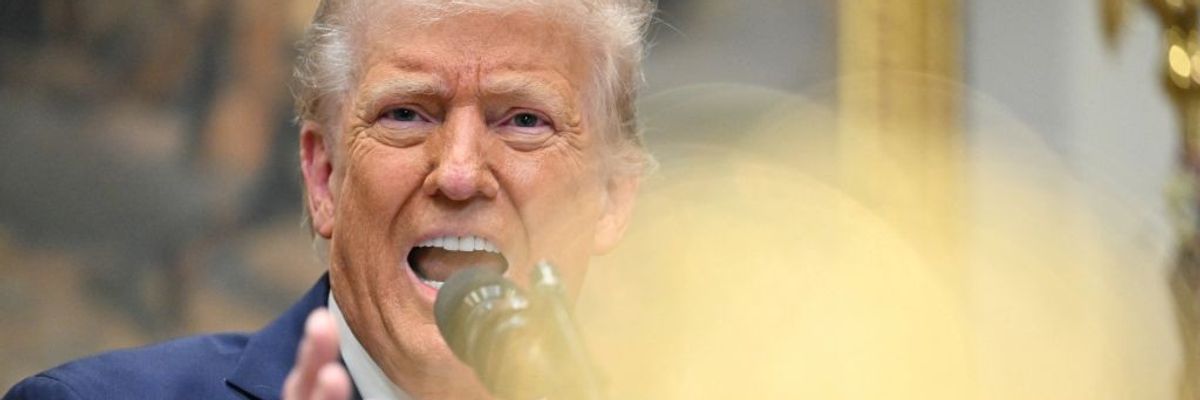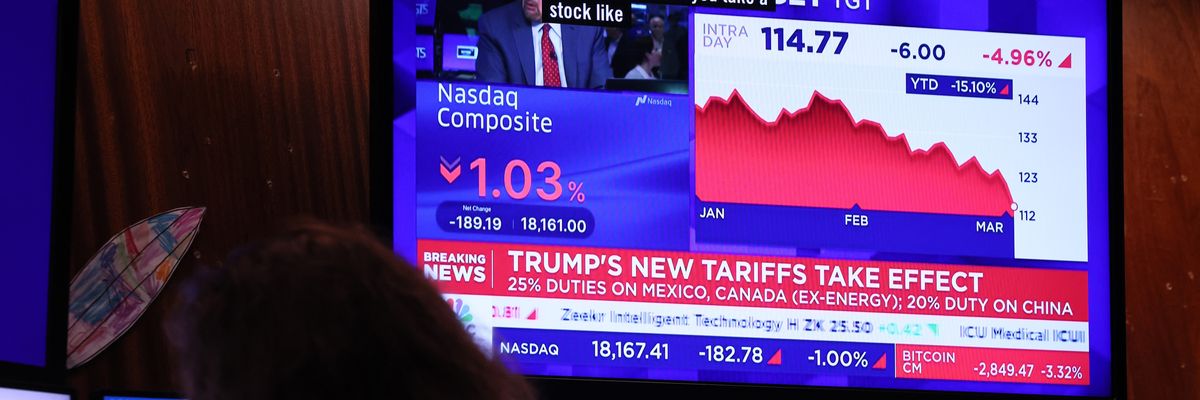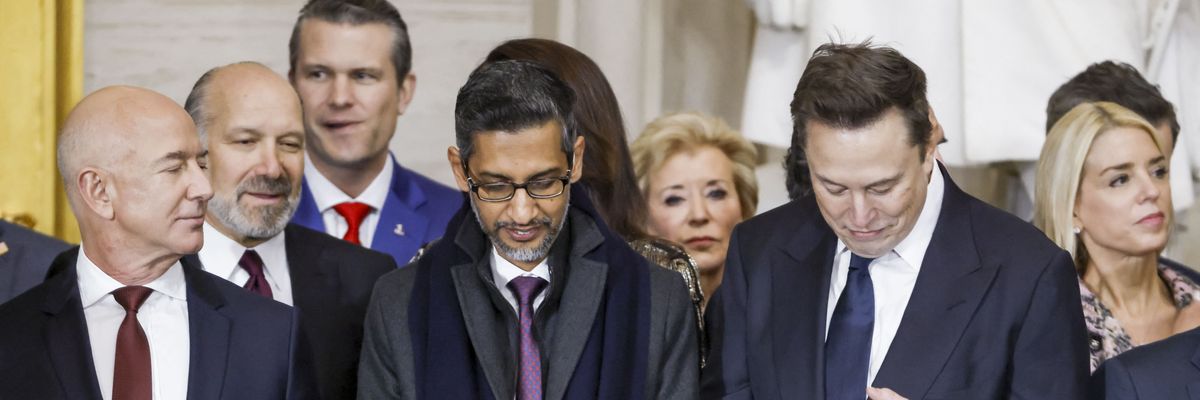Trump Set to Whack US Working Class With Historic $3,000 Tax Hike
There is an old saying in Washington that if you want to understand politicians, look at what they do, not what they say. On that front there is no ambiguity. The Republican president is imposing big new taxes, and he is doing it in a way that does not require congressional approval.

U.S. President Donald Trump speaks in the Roosevelt Room of the White House in Washington, DC, on March 3, 2025. Trump said chip-making giant TSMC will invest "at least" $100 billion in the United States to build "state of the art" chip manufacturing facilities.
Photo by Roberto Schmidt / Getty Images)
There is an old saying in Washington that if you want to understand politicians, look at what they do, not what they say. On that front there is no ambiguity. The Republican president is imposing big new taxes, and he is doing it in a way that does not require congressional approval.

U.S. President Donald Trump speaks in the Roosevelt Room of the White House in Washington, DC, on March 3, 2025. Trump said chip-making giant TSMC will invest "at least" $100 billion in the United States to build "state of the art" chip manufacturing facilities.
Photo by Roberto Schmidt / Getty Images)
Dean Baker
Mar 04, 2025
Mar 04, 2025
Beat the Press
The waiting is almost over, Donald Trump is about to hit America’s workers with the largest tax increase they have ever seen. Trump’s taxes on imports (tariffs) from Canada, Mexico, and China will cost people in the United States somewhere around $400 billion a year or around $3,000 a household.
This is far larger than any tax increase we’ve seen in the last half-century, and unlike tax increases put in place by Clinton and Obama, it will primarily hit low and middle-income households. Their tax increases primarily hit the top 1% percent, which is probably why they got so much more attention from the media.
It is not clear what our reality TV show president hopes to accomplish with these tax hikes. His stated reasons don’t make much sense. Canada, Mexico, and China are already cooperating with the U.S. on the issues he is complaining about. There is a minimal flow of fentanyl and undocumented immigrants from Canada.
If Trump can’t find major savings in the budget, then he will have to raise other taxes if he doesn’t want to hugely increase the deficit with his tax cuts for the Elon Musk crowd. This is the most obvious explanation for Trump hitting us with his huge import taxes.
Mexico sharply curtailed the flow of undocumented immigrants following a deal with Biden last summer. We can look to reduce the flow further, but that could probably be accomplished by negotiations rather than imposing a big tax on U.S. households.
China has also cooperated in reducing the flow of precursor substances for making fentanyl. Here also there were probably better prospects for further reductions through a path of negotiations rather than Donald Trump’s big tax increases.
Also, unlike Canada and Mexico, China’s economy is not that dependent on its trade with the U.S. China’s exports to the U.S. come to less than 2.5 percent of its GDP. If Donald Trump’s taxes reduce that by half, it could look to export to other countries (like Canada or Mexico) or increase domestic demand.
It seems implausible that Donald Trump’s stated reasons for his tax increase are his actual reasons. In principle, taxes on imports can be used as part of an industrial strategy to build up key industries, as was explicitly the case under Biden. His tariffs were intended to promote the advanced semi-conductor industry, as well as solar and wind energy and electric cars.
However, it would be difficult to find any evidence of an industrial strategy in Trump’s plans. He actually is deliberately sabotaging the industries Biden sought to foster.
There is an old saying in Washington that if you want to understand politicians, look at what they do, not what they say. On that front there is no ambiguity. Donald Trump is imposing big new taxes, and he is doing it in a way that does not require congressional approval.
He has made no secret of his intention to cut taxes on the wealthy. While Elon Musk and DOGE boys have put on a good show with the chain saw and breaking into various government agencies, the savings they can actually identify don’t amount to much.
If Trump can’t find major savings in the budget, then he will have to raise other taxes if he doesn’t want to hugely increase the deficit with his tax cuts for the Elon Musk crowd. This is the most obvious explanation for Trump hitting us with his huge import taxes. It sounds much better to pretend he’s cracking down on fentanyl and illegal immigration than to say he’s whacking ordinary workers with a big tax increase. But that is what Donald Trump is doing.
The waiting is almost over, Donald Trump is about to hit America’s workers with the largest tax increase they have ever seen. Trump’s taxes on imports (tariffs) from Canada, Mexico, and China will cost people in the United States somewhere around $400 billion a year or around $3,000 a household.
This is far larger than any tax increase we’ve seen in the last half-century, and unlike tax increases put in place by Clinton and Obama, it will primarily hit low and middle-income households. Their tax increases primarily hit the top 1% percent, which is probably why they got so much more attention from the media.
It is not clear what our reality TV show president hopes to accomplish with these tax hikes. His stated reasons don’t make much sense. Canada, Mexico, and China are already cooperating with the U.S. on the issues he is complaining about. There is a minimal flow of fentanyl and undocumented immigrants from Canada.
If Trump can’t find major savings in the budget, then he will have to raise other taxes if he doesn’t want to hugely increase the deficit with his tax cuts for the Elon Musk crowd. This is the most obvious explanation for Trump hitting us with his huge import taxes.
Mexico sharply curtailed the flow of undocumented immigrants following a deal with Biden last summer. We can look to reduce the flow further, but that could probably be accomplished by negotiations rather than imposing a big tax on U.S. households.
China has also cooperated in reducing the flow of precursor substances for making fentanyl. Here also there were probably better prospects for further reductions through a path of negotiations rather than Donald Trump’s big tax increases.
Also, unlike Canada and Mexico, China’s economy is not that dependent on its trade with the U.S. China’s exports to the U.S. come to less than 2.5 percent of its GDP. If Donald Trump’s taxes reduce that by half, it could look to export to other countries (like Canada or Mexico) or increase domestic demand.
It seems implausible that Donald Trump’s stated reasons for his tax increase are his actual reasons. In principle, taxes on imports can be used as part of an industrial strategy to build up key industries, as was explicitly the case under Biden. His tariffs were intended to promote the advanced semi-conductor industry, as well as solar and wind energy and electric cars.
However, it would be difficult to find any evidence of an industrial strategy in Trump’s plans. He actually is deliberately sabotaging the industries Biden sought to foster.
There is an old saying in Washington that if you want to understand politicians, look at what they do, not what they say. On that front there is no ambiguity. Donald Trump is imposing big new taxes, and he is doing it in a way that does not require congressional approval.
He has made no secret of his intention to cut taxes on the wealthy. While Elon Musk and DOGE boys have put on a good show with the chain saw and breaking into various government agencies, the savings they can actually identify don’t amount to much.
If Trump can’t find major savings in the budget, then he will have to raise other taxes if he doesn’t want to hugely increase the deficit with his tax cuts for the Elon Musk crowd. This is the most obvious explanation for Trump hitting us with his huge import taxes. It sounds much better to pretend he’s cracking down on fentanyl and illegal immigration than to say he’s whacking ordinary workers with a big tax increase. But that is what Donald Trump is doing.
After a monthlong delay, Trump administration tariffs on Mexican and Canadian imports went into effect Tuesday.

Financial news is seen on a television on the floor of the New York Stock Exchange during morning trading on March 4, 2025 in New York City.
(Photo: Michael M. Santiago/Getty Images)
Eloise Goldsmith
Mar 04, 2025
COMMON DREAMS
As the Trump administration's purge of federal workers continues and tariffs imposed on key U.S. trade partners Mexico and Canada take effect Tuesday, multiple economic indicators are warning of potential pain ahead.
On Monday, the Federal Reserve Bank of Atlanta released an estimate for GDP performance in the first quarter of 2025, which showed an economic contraction of 2.8%. The "GDPNow" estimate is a model-based projection that is not an official forecast from the Atlanta Fed, but it does paint a different economic picture from just a few weeks ago, when the same model-based projection estimated growth of almost 3% in early February.
"Basically unprecedented for a new administration to inherit a strong economy and immediately tank it as both businesses and consumers internalize its agenda," wrote Bharat Ramamurti, a former deputy director at the National Economic Council, in response to the prediction from the Atlanta Fed.
Stocks also tumbled Monday after Trump announced that 25% tariffs on Canada and Mexico would go into effect the next day. Trump also reiterated that the U.S. would impose an additional 10% tariff on China, on top of 10% tariffs that were already in effect.
Meanwhile there are also signs that consumer confidence is declining. The research group the Conference Board released its Consumer Confidence Index for February on Tuesday, which showed the largest monthly decline in consumer confidence since August 2021. "Respondents to the board's survey expressed concern over inflation with a significant increase in mentions of trade and tariffs, the board said," according to The Associated Press. The retail giant Target said Tuesday that consumer confidence is waning, according to CNN.
In a video discussing the Atlanta Fed's "GDPNow" estimate, journalist Krystal Ball reminded listeners that billionaire Elon Musk, the man Trump has deputized to help oversee cuts to the federal spending and bureaucracy, said that the work of his Department of Government Efficiency would cause pain. Musk in October 2024 said that then yet-to-be-created body's work would "necessarily involve some temporary hardship," according to Vox.
The Trump administration has so far already cut tens of thousands of workers, but even if Trump successfully carried out his proposed mass firings of probationary workers (which a judge recently said were likely illegal), possibly impacting 200,000 people, that "on its own, is not recessionary," according to economist Ernie Tedeschi, director of economics at the Yale University Budget Lab, who was interviewed by CNBC.
The U.S. Bureau of Labor Statistics' February employment situation report will be released on Friday, and economist Dean Baker, who works for the left-leaning Center for Economic and Policy Research, wrote Tuesday that the numbers "are not not likely to pick up much of the effect of the DOGE cuts." That's partly because the data will not capture the time period when many of the cuts went into effect, according to Baker.
The impact of tariffs, however, is more certain. China, Mexico, and Canada account for over 40% of U.S. imports, and key goods imported from the three countries include crude petroleum, cars, computers, telephones, and car parts and accessories, according to the The New York Times.
Tariffs are essentially a tax on imported goods that economists say are largely passed on to consumers.
According to analysis released in early February, the Peterson Institute for International Economics found that the tariffs that were previously announced but went into effect on Tuesday constitute the "the largest tax increase in at least a generation."
Taking into account the 25% tariffs on goods from Canada (aside from the lower rate for Canadian energy) and Mexico, and the 10% increase in tariffs on imports from China, "the direct cost of these actions to the typical, or median, U.S. household would be a tax increase of more than $1,200 a year."
After the Trump administration announced the tariffs on Mexico and China, which the White House said were being implemented to pressure the three countries into halting the flow of fentanyl and immigrants, Trump agreed in February to delay their imposition on Canada and Mexico for a month after those countries announced concessions.
The left-leaning economist Paul Krugman called the tariffs on Mexico and Canada, two countries with whom Trump once helped negotiate a free trade deal, "a profoundly self-destructive move."
"It will impose huge, possibly devastating costs on U.S. manufacturing, while significantly raising the cost of living—without any visible justification," he wrote.
Top Economist Has Winning Idea for Trump's Trade War: Tariffs for US Oligarchs
"If it's a trade war Trump wants, consumers in Mexico, Canada, Europe, and beyond should unite to ensure that Musk and his fellow oligarchs feel the cost."

Amazon founder Jeff Bezos, Alphabet CEO Sundar Pichai, and Tesla CEO Elon Musk attend the inauguration ceremony of U.S. President Donald Trump in Washington, D.C., on January 20, 2025.
(Photo: Shawn Thew/POOL/AFP via Getty Images)
Julia Conley
Mar 03, 2025
COMMON DREAMS
As U.S. President Donald Trump weighed 25% tariffs he plans to impose on Canada and Mexico on Monday, with the White House sending mixed messages in recent days about when the levies will go into effect, a top progressive economist has proposed foreign countries should respond to "the trade war Trump seems determined to stoke" by targeting the "Achilles heel" embedded in the Trump administration.
"Mexico, Canada, and Europe have leverage," wrote Gabriel Zucman, director of the E.U. Tax Observatory, in a column Friday, pointing to the country's "highly internationalized oligarchy: a small group of ultra-wealthy individuals whose fortunes depend on access to global markets."
Commerce Secretary Howard Lutnick indicated Monday morning that Trump has yet to decide whether tariffs on Canadian and Mexican imports—including produce, lumber, vehicles, and electronics—will go forward just after midnight on Tuesday as previously planned; the president has also recently said the tariffs could be delayed until April 2.
But Zucman wrote that whenever the policy does enter force, Canada, Mexico, and any other countries affected "should retaliate by taxing U.S. oligarchs."
Powerful business owners like Tesla CEO Elon Musk—now also spearheading Trump's gutting of federal agencies through the Department of Government Efficiency (DOGE)—Amazon founder Jeff Bezos, and Meta CEO Mark Zuckerberg all rely on markets outside of the U.S. to enrich their companies, which "gives foreign governments influence," Zucman continued.
"If Tesla wants to sell cars in Canada and Mexico, Elon Musk—Tesla's primary shareholder—should be required to pay taxes in those jurisdictions," he wrote. "Of course, this strategy is explicitly extraterritorial, since it applies tax obligations on foreign actors in exchange for access to local markets. But rather than fearing extraterritoriality, countries should embrace it as a tool for enforcing minimum standards, curbing inequality, preventing tax evasion, and promoting sustainability."
Tariffs on oligarchs could fight against Trump's attacks on environmental regulations, push for tax giveaways to billionaires at the cost of crucial public services, and advocacy for re-segregating workplaces, suggested Zucman, while shifting "the economic conflict from a battle between countries—which fuels nationalist tensions and economic retaliation—to one between consumers and oligarchs."
Countries could also "collect taxes that multinationals have dodged elsewhere, gradually eroding the appeal of tax competition" and triggering a "virtuous cycle," added the economist, who focuses on wealth inequality and international tax policy.
With tariffs on oligarchs in place, he said, firms would no longer be incentivized to move to countries that hand out corporate tax breaks because their savings would be offset by the tariffs levied by countries with large markets.
Governments have been accused in taking part in a "race to the bottom" as they try to attract large multinational companies run by some of the richest people in the world, with huge tax breaks that weaken "national safety nets, [kill] jobs by subsidising capital at the expense of labor, [allow] elites to escape the rule of law, and [reduce] productivity and economic growth," as the Tax Justice Network wrote in a 2020 report.
With tariffs for oligarchs, said Zucman "the race to the bottom would soon be replaced by a race to the top."
While the first weeks of Trump's second term in the White House have raised fears over a looming trade war, attacks on immigrants and transgender Americans, mass firings of federal workers, and the United States' withdrawal from international agreements and organizations, Zucman said the Trump presidency "also presents an opportunity."
"This is a moment to rethink international economic relations, calmly but radically," wrote Zucman. "The best response is a new global economic framework that neutralizes tax competition, fights inequality, and protects our planet. Under such a framework, importing countries would enforce tax justice beyond their borders, ensuring that multinational corporations and their billionaire owners pay their fair share."
"If it's a trade war Trump wants," he said, "consumers in Mexico, Canada, Europe, and beyond should unite to ensure that Musk and his fellow oligarchs feel the cost."

No comments:
Post a Comment